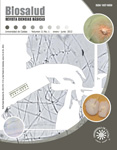Authors
Abstract
Objective: to compare two laboratory diagnosis techniques for carnitine acylcarnitine translocase deficiency, a rare inherited autosomal recessive disorder in fatty acid oxidation. Materials and methods: fibroblasts of patients and controls were incubated with tritiated substrates and deuterated substrates. Results: a severe depression for oxidizing the tritiated substrates was observed for the fibroblasts of patients with this disease; however it was not possible to establish a characteristic profile for the diagnosis of the disease using deuterated substrates. Conclusion: the incubation of fibroblasts using tritiated substrates constitutes a good tool for laboratory diagnosis of patients suffering carnitine-acylcarnitine translocase deficiency, in contrast, incubation with deuterated substrates does not.
References
Indiveri C, Giangregorio N, Iacobazzi V, Palmieri F. Site-directed mutagenesis and chemical modiWcation of the six native cysteine residues of the rat mitochondrial carnitine carrier: implications for the role of cysteine-136. Biochemistry 2002; 41:8649-56.
Tonazzi A, Giangregorio N, Indiveri C, Palmieri F. Identification by site-directed mutagenesis and chemical modification of three vicinal cysteine residues in rat mitochondrial carnitine/acylcarnitine transporter, J Biol Chem 2005; 280:19607-12.
Pierre G, Macdonald A, Gray G, Hendriksz C, Preece MA, Chakrapani A. Prospective treatment in carnitine-acylcarnitine translocase deficiency. J Inherit Metab Dis 2007; 30(5):815.
Rubio-Gozalbo ME, Vos P, Forget PPh, Van Der Meer SB, Wanders RJA, Waterham HR, et al. Carnitineacylcarnitine translocase deWciency: case report and review of the literature. Acta Paediatr 2003; 92:501-4.
Lowry OH. Rosebrough NJ, Farr AL, Randall RJ. Protein measurement with the Folin phenol reagent. J Biol Chem 1951; 193:265-75.
Ventura FV, Costa CG, Struys EA, Ruiter J, Allers P, Ijlst L, et al. Quantitative acylcarnitine profile in fibroblasts using U-13 Cpalmitic acid: an improved tool for the diagnosis of fatty acid oxidation defects. Clin Chem Acta 1999; 281:1-17.
Roe CR, Roe DS. Recent developments in the investigation of inherited metabolic disorders using cultures human cells. Mol Genet Metab 1999; 68:243-57.
Olpin SE, Manning NJ, Carpenter K, Middleton B, Pollit RJ. Differential diagnosis of hydroxydicarboxylic aciduria based on release of 3H2O from [9, 10- 3H]-myristic and [9,10-3H]-palmitic acids by intact cultured fibroblasts. J Inher Metab Dis 1992; 15:883-90.
Roe DS, Yang BZ, Vianey-Saban C, Struys E, Sweetman L, Roe CR. Differentiation of long-chain fatty acid oxidation disorders using alternative precursors and acylcarnitine profiling in fibroblasts. Mol Genet Metab 2006; 87(1):40-7.
Nada MA, Chace DH, Sprecher H, Roe CR. Investigation of ß-oxidation intermediates in normal and MCAD-deficient human fibroblasts using tandem mass spectrometry. Biochem Mol Med 1995; 54:59-66.
Roe CR, Roe DS. Recent developments in the investigation of inherited metabolic disorders using cultures human cells. Mol Genet Metab 1999; 68:243-57.
Costa C, Costa JM, Slama A, Boutron A, Vequaud C, Legrand A, et al. Mutational spectrum and DNAbased prenatal diagnosis in carnitine-acylcarnitine translocase deWciency. Mol Genet Metab 2003; 78: 68-73.
Korman SH, Pitt JJ, Boneh A, Dweikat I, Zater M, Meiner V, et al. A novel SLC25A20 splicing mutation in patients of different ethnic origin with neonatally lethal carnitine-acylcarnitine translocase (CACT) deficiency. Mol Genet Metab 2006; 89(4):332-8.
Wang GL, Wang J, Douglas G, Browning M, Hahn S, Ganesh J, et al. Expanded molecular features of carnitine acyl-carnitine translocase (CACT) deficiency by comprehensive molecular analysis. Mol Gen Metab 2011; 103:349-57.
Yang BZ, Mallory JM, Roe DS, Brivet M, Strobel GD, Kerri M, et al. Carnitine/Acylcarnitine Translocase Deficiency (Neonatal Phenotype): Successful Prenatal and Postmortem Diagnosis Associated with a Novel Mutation in a Single Family. Mol Gen Metab 2011; 73: 64-70.

 PDF (Español)
PDF (Español)
 FLIP
FLIP














